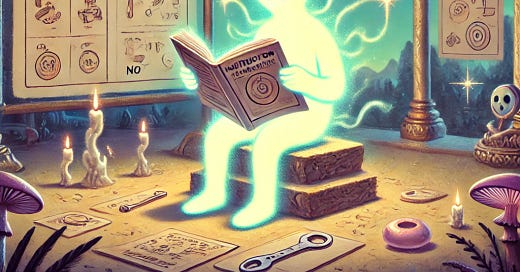Defining the Game
As I have mentioned once or twice before, I am a very big believer in the Advaita Vedantic concept of lila, or divine play. The key idea is that we are all God experiencing itself through playing as us, enjoying all of the roles and experiences existence has to offer. From cop to criminal, atheist to religious fundamentalist, sinner to saint, God plays it all. God is enjoying writing this post through the role of Gabriel Solomon while enjoying the role of reading, liking, and subscribing through you.
This game is made possible through what Advaita Vedanta calls maya, illusion. Our belief that this is real is what makes the game work, and it’s what makes romance, hatred, and awkward elevator small talk as impactful as they are. Maya isn’t bad, per se, because it’s what makes the game playable. Once we truly wake up from the illusion, souls often go home and stop playing. That’s not always the case, but that’s how it is in many traditions. Mahayana Buddhists have the option of the Bodhisattva vow, which would have you coming back until Samsara, the realms of rebirth, are empty. But for most people, it’s time to pack it up and go home.
Although this game, existence itself, is not what we traditionally think of as a game, it does have some core similarities. Today, we’re going to talk specifically about the rules of the game for those of us playing.
Karma
Karma is a word that pretty much everyone knows, but many have a difficult time defining. Put simply, karma is "action." Whatever you do is your karma, and whatever comes out of that is the further karma you have created. Sometimes the result of an action is immediate, sometimes it’s prolonged to later in this lifetime, and sometimes it spans into the next. Actions have physical and metaphysical aspects to them, and everything exists within the context of the whole, so there is a lot that goes into how karma manifests.
Another element of karma is intention. The same action could create completely different karma based on the intention. For example, if I put a blade into your chest to perform open-heart surgery and you die, the best of intentions were present, making it more karmically positive. If I stab you in the chest for your wallet, it’s the same people and cause of death, but this scenario is obviously more karmically negative.
Some people think karma is some sort of cosmic justice system, but it isn’t—it’s more like any other law the universe runs on. Karma is more akin to gravity or Newton’s laws of motion. To compare it to Newton’s third law specifically, you are living in the accumulated results of all of your actions. The great guru Padmasambhava said it best: “If you want to know your past life, look at your present condition; if you want to know your future life, look at your present actions.”
And because of the continuation of the soul, the cause and effects of our many lives span a very long time, entangling with the karma of those we dance with along the way.
Sinful Nature
Sin is a term that’s been used by many faiths in many different ways. Christians and Muslims generally view sin as breaking the legal system built into the fabric of the universe by God. If grievous enough in sinful behavior, one may even find themselves incarcerated in Hell, the archetype of horrible prison sentences. Their predecessor, Judaism, views sin less as a violation of the law and more as “missing the mark,” falling out of alignment with the commandments of God. This is why the word for repentance literally means to “return,” as it’s about getting back on the right track.
St. Augustine further developed the idea of sin away from Judaism and into contemporary Catholicism by coining the idea of original sin—the notion that everyone is corrupted by nature and fundamentally flawed. The original sin he refers to is the eating from the Tree of Knowledge. Whether or not you call it original sin, I think we can all agree with the premise that nobody is perfect.
The idea of sin in Sikhism is that sin is any action that takes us away from reaching union with the Divine. It is behavior that feeds the ego, builds perceived separateness, and further entrenches us in the world of materialism.
To combine these views: sin is the perfectly natural human tendency to screw up, creating suffering through negative karma and perpetuated separateness.
Redemption
If sinning is missing the mark aiming toward God, and karma is created by intention paired with action, then we must intentionally act in a way that orients us back toward the path to God. If you’re interested in additional paths to virtue, you can read a previous post about the topic here. There are many ways to orient yourself back on track, but today we’re going to touch upon my preferred lila gameplay tactics: karma yoga and seva.
Karma yoga is the spiritual path of action. It’s living your life while making every action an offering to God. And remember, karma is very much an intentional practice, even if the external action doesn’t explicitly seem like an offering. Mopping the floor could potentially be an offering to God if the orientation of the mind is finely tuned enough. Karma yoga is a very powerful practice that, if done deeply, turns everything into a stepping stone toward the Divine.
Seva is the practice of selfless service. It’s the element of karma yoga that I particularly try to involve myself in. It’s helping people for no reason other than to help people. The more you fully involve yourself in helping people for the sake of helping people, the more your ego will dissolve, oneness will be realized, and your path will be corrected.
Mother Teresa, a famous example of living through seva, described the people she helped as Jesus in disguise. How amazing would that perspective be? If we can look into the eyes of complete strangers, see behind the drama of emotion and suffering, and see God looking back, every interaction we have can be an intimate moment with the Divine.
Sportsmanship: Wise vs. Idiot Compassion
Compassion is the One relating to itself. It’s the secret to a beautiful life for everyone involved. The Dalai Lama has been quoted as saying, “If you want others to have a good life, practice compassion. If you want to have a good life, practice compassion.” It’s nonduality in action, it’s love manifest. It’s awesome, but it must be exercised correctly. We must know the difference between wise and idiot compassion.
Idiot compassion, coined by Chögyam Trungpa, is an anxious tendency we all have. It’s the need we have to instantly take the pain away—to agree with our friends when the truth will hurt their feelings or to bail someone out of trouble they caused. We act in idiot compassion because it’s painful to care about people, and we tend to their pain in a way that may instantly relieve us of ours. This isn’t helpful to anyone in the long term, of course, and that’s why it’s important to be aware of this behavior to not perpetuate suffering. They say the road to Hell is paved with good intentions, after all.
Wise compassion, on the other hand, is loving but firm. It’s the practice of understanding the universal human tendency to miss the mark, forgiving it, and then recognizing the karmic predicament we’re all in to act accordingly. Wise compassion in action is seeing the role each person has in the situation, playing yours, and guiding people toward the right direction so they can play their role well. For example, you can’t quit someone else’s drug habit. Your role may be to listen and, when asked, truthfully tell them they’re harming themselves and need help. Do only what you’re supposed to be doing according to the karma of the situation, despite what you may feel the urge to do.
Wise compassion starts as a disciplined practice but, like any practice of virtue, becomes automatic. Buddhists call this upaya, or “skillful means,” which could be compared to de or eudaimonia, but it is more heart-centric. Once a practice of seva is carried out with wise compassion, you will find that your natural tendency is to heal and help wherever you go. You will understand more about what is appropriate for the person and the situation, and with clarity of intentions, even the smallest actions can sometimes make a huge difference.
Remember that in the divine game, everyone is playing. If you’re spiritually conscious, that simply means you understand the game is going on. An understanding of others’ lack of contextual awareness about its meaning brings suffering and confusion, perhaps leading to unsavory behaviors. That’s okay. That’s their role in the game. Yours is helping through playing within the context of you knowing and them not. You don’t need to change them. Just forgive them for being human and help as wisely as you can.
And Don’t Forget To Have Fun!
With lila in mind, we really ought to stop taking everything so seriously. I know I keep coming back to this, but have fun with it! If the joke is on you, laugh along. If you’re gonna cry, fully experience the broad array of emotions that flow out with your tears. If you’re gonna laugh in public, no shame in letting that laugh come out at its natural full force.
And don’t be so competitive or closed off. It’s all a game, sure, but it’s not an easy one. If your playmates are suffering, see that. You don’t have to break the suspension of disbelief in order to play fair and compassionately. Just remember the rules. Remember your roles. Remember who’s playing in the first place. And keep all that in your mind and heart while helping them play along.






